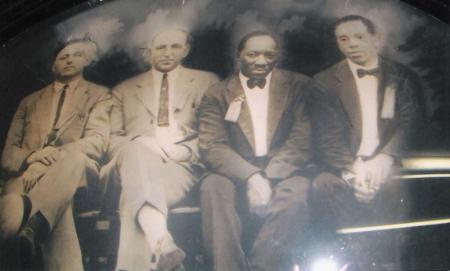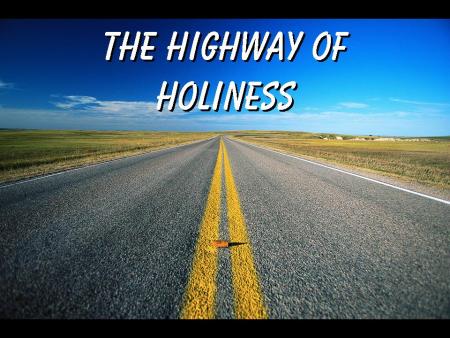
by Joe McKeever
I was scheduled to bring the final sermon at a church that was one week away from welcoming its new pastor. My first thought was to pull out a message I had used before with other congregations that would be apt for this occasion. Then, an idea occurred to me.
Why not ask the incoming pastor what he’d like me to say to the church?
In reply to my e-mail, an hour later I had his answer. One would have thought he had been waiting for someone to ask him that very question since he was so prompt in responding.
He said, “I would love to come into a church that was unified, where everyone loved each other, and they all prayed for the pastor.” He even gave a text for each point from Paul’s Epistle to the Ephesians.
The more I reflected on it all week, the more I realized any pastor coming into a new church would give a month’s salary for these three gifts.
UNITY: Ephesians 4:11-16
“And He gave some as apostles, and some as prophets, and some as evangelists, and some as pastors and teachers for the equipping of the saints for the work of the ministry, to the building up of the body of Christ; until we all attain to the unity of the faith, and of the knowledge of the Son of God….”
The passage ends, “…Christ, from whom the whole body, being fitted and held together by what every joint supplies, according to the proper working of each individual part, causes the growth of the body for the building up of itself in love.”
Kent Hughes says anyone preaching on Christian unity starts with this passage, and, we add, for good reason. The Holy Spirit speaking through Paul covers the subject as well as we can find it anywhere.
In surfing the net on the subject of “Christian unity” and “disharmony in the church,” I ran across a sermon from a fellow of another denomination—one of those convinced they alone are going to Heaven—who said that Christian unity is all of us speaking the same thing, doing the same thing, believing the same way, and such. My main reaction to that is: baloney.
The kind of unity pictured in Ephesians 4 is not the lifeless unity of a brick or a stone, but that of a living body. Our bodies have hundreds of different parts, none of them resembling the others, but each doing its own work and all working together. The result is not sameness, but harmony. When a body functions as it was intended, the result is a beautiful unity.
Think of a congregation singing a hymn in unison. Everyone sings the same notes. There’s a certain beauty about it, but by the third verse, it’s boring. How much better for some to sing the melody, and others to find harmony lines of bass, tenor, alto, and variations of each. We end up with a full-bodied chorus of voices, some coming in from left field, some booming up from the dugouts, some hovering above in the atmosphere, and others flowing in from the grandstands—all joining in to produce a magnificent blend.
That is not uniformity—which is what the internet preacher was calling for—but unity.
It’s the unity of a great football team. Only two or three fellows play quarterback and they alternate with each other. The rest hold down positions with names like end, guard, center, tackle, running back, cornerback, and linebacker. We have punters and kickers and head coaches and offensive coaches and quarterback coaches, trainers and gofers and cheerleaders and front office people. When everyone does his job well, you have unity, even though no two are doing the same thing in the same way.
That’s how God has set up His church. It’s just fine to have disagreements and we even welcome them, because no one person on a team or in the church has a monopoly on all wisdom. Disagreements helps the leaders to hear all sides of issues and force them to think matters through.
What this means, of course, is that a key ingredient in unity is maturity, one aspect of which is the ability to appreciate all views on a subject and to find the appropriate action for a situation. Immaturity fears dissent and panics at the first sign of a disagreement.
Christian unity finds its strength in each member of the body being true to his assignment.
LOVE: Ephesians 4:25-32
“Therefore, laying aside falsehood, speak truth each one of you with his neighbor, for we are members of one another. Be angry, and yet do not sin; do not let the sun go down on your anger, and do not give the devil an opportunity. He who steals must steal no longer…. Let no unwholesome word proceed from your mouth…. Do not grieve the Holy Spirit of God, by whom you were sealed for the day of redemption… Let all bitterness and wrath and anger and clamor and slander be put away from you, along with all malice. Be kind to one another, tender-hearted, forgiving each other, just as God in Christ also has forgiven you.”
Interestingly, the word “love” is not found in that passage. And yet all the actions Paul commands of the Ephesians comprise the very definition of love. In the Scriptures, we recall, love is never an emotion but always an action.
Love is something we do.
So, what does love in a congregation do? Love tells the truth, controls its anger, works instead of steals, speaks kindly, is kind, sweet-spirited, and forgiving.
Turn it around, then, and ask, “When love is missing, what do we find?” The answer is here, to Lies, rage, stealing, harshness, ugliness, mean-spiritedness, and lack of forgiveness. All of these grieve the Holy Spirit and bring our effectiveness to a grinding halt.
In his commentary on Ephesians, Kent Hughes tells of a rancorous church fight which drove both sides to lawsuits in a public court. The judge threw out the suits and urged them to take the matter to a church court of their denomination. There, the panel decided in favor of one side and ordered the other group out of the facilities altogether. That group went across town and started a church of their own.
Hughes reports that the church court was able to go back and find the very beginnings of the dispute: at a church dinner, one of the elders was upset because a child sitting next to him received a larger slice of ham.
Just so are churches split, the cause of Christ slandered, the mission fields neglected, and God’s people diverted from service.
If a key element in unity is maturity, we suggest a key ingredient in love is humility. To love is to put people at least on an equal level with ourselves, if not above.
Actually, love is the glue that bonds the church in unity. Love for Christ and love for each other. There’s a tiny line in Colossians 2:2 that reads: “their hearts having been knit together in love.” It’s the same verb Paul uses in Ephesians 4:16 and means “joined together” the way the ligaments and tendons hold the joints of the body together.
That’s what love does, knit us together and hold us there. There will be a lot of movement in this body, so the ties have to be strong.
PRAYER: Ephesians 6:18-20
“With all prayer and petition, pray at all times in the Spirit, and with this in view, be on the alert with all perseverance and petition for all the saints, and pray on my behalf that utterance may be given to me in the opening of my mouth, to make known with boldness the mystery of the gospel, for which I am an ambassador in chains, that in proclaiming it I may speak boldly, as I ought to speak.”
We note in the context for this passage that it follows the full layout of the armor Christians wear for the spiritual warfare they conduct in this world. After being adequately alerted and suitably armored, we are ready to pray.
You know the old jokes about the old maid English teachers. Well, I used to be an English teacher and I can tell you, any such instructor would have handed verse 18 back to Paul and said, “Simplify this. It’s too complicated. I’m not sure what you’re saying.” But, we have it the way he said it, and will have to try to negotiate our way through it.
John Bunyan called this “all prayer,” meaning that prayer is the first, the best, the most, the greatest, and we do well to infuse everything we do with this spiritual discipline.
“Pray at all times in the Spirit.” Spiritual warfare demands that the believer stay close to the Lord and abide in Him for strength and direction.
“For all the saints.” Be on the alert with all perseverance and petition for all the saints, Paul says. That instruction reminds us we’re not praying just for the members of our group or our congregation. You drive past a church, pray for its members. You read something about a congregation, pray for its people. You meet a pastor of another church or hear one on the radio, pray for him and his people.
“And pray for me.” And what shall we pray for you, Paul? Bear in mind that most likely, he is in prison in Rome (he calls himself “a prisoner in chains”). So, he wants out, right? Wants better treatment? A good lawyer? Leniency from the judge? Decent food. Protection from some bully? Nope. None of those things.
“Pray that I’ll be able to preach the Word boldly with effectiveness.” That’s all he wanted.
The new pastor of our church could produce quite a list of prayer needs, no doubt, including the Lord’s protection as he relocates his family to our city, provision in selling his old house and purchasing one here, and wisdom in the many decisions he will make as he begins his ministry. But pre-eminently, I believe he would say with Paul that his first prayer request is for his preaching, that every time he stands he will have God’s message and declare it faithfully and forcefully.
Unity, love, prayer. We recall what great concerns these were with the Lord for His disciples in all His teachings, but, never more than in His final hours with them in the upper room. While there was a finality about His words that night, a new and exciting chapter for the disciples was about to begin. Therefore, nothing would be more important than that they stay together, love one another, and be faithful in praying.
“The Upper Room Discourse” covers chapters 13-17 of John’s Gospel. In His final words with the disciples before He goes to the cross, we find Jesus emphasizing these concerns again and again throughout….
Chapter 13. “A new commandment I give to you, that you love one another; even as I have loved you, that you also love one another. By this shall all men know that you are my disciples, if you have love for one another.” (Verses 34-35) Love, Unity.
Chapter 14. “If you love me, keep my commandments…. He who has my commandments and keeps them is the one who loves me; and he who loves me will be loved my my Father…. He who does not love me does not keep my words….” (V.15, 21, 24) Love.
Chapter 15. “Just as the Father loved me, I have also loved you. Abide in my love.” “This is my commandment, that you love one another, just as I have loved you. Greater love has no one than this, that one lay down his life for his friends.” “This I command you, that you love one another.” (V. 9, 12, 13, 17) Love, Unity.
Chapter 16. “Truly, truly, I say to you, that if you ask the Father for anything in my name, He will give it to you….ask and you will receive, so that your joy may be made full.” (V. 23, 24) Prayer.
Chapter 17 is not part of the discourse proper, but appears to have been prayed in the Upper Room with the disciples that evening. Scholars call it “the great high priestly prayer” of Jesus. Notice the direction of His requests in this prayer. After asking repeatedly that the Father would “keep them in your name,” Jesus said, “I do not ask on behalf of these alone, but for those also who believe in Me through their word, that they may all be one; even as you Father are in me and I in you, that they also may be in us, so that the world may believe that you sent me.” (vs.20-21.) Unity.
“…that they may be perfected in unity, so that the world may know that You sent me, and loved them, even as you have loved me.” (vs. 23) Unity, love.
“…I have made your name known to them, and will make it known, so that the love with which you loved me may be in them, and I in them.” (vs. 26) Love, unity.
Stick together. Love each other. Look to Jesus in prayer.
Interesting that He emphasized unity and love far more than prayer. Maybe because those are harder to achieve? Contrary to their independent natures? Require more effort?
In the early part of the Acts of the Apostles, we read that the disciples were “all together in one place” and praying (Acts 2:1), “were together and had all things in common” (Acts 2:44), “and the congregation of those who believed were of one heart and soul” (Acts 4:32).
They had learned their lesson well, it seems, from the Lord Himself.
On the internet, I ran across an excellent devotional from the First Baptist Church of Sault Ste. Marie, Ontario, Canada, dated October 4, 2003. A church member by the name of Dan Burns shared on the subject of protecting the unity of the church. He writes:
“Unity in the church is so important that the New Testament gives more attention to it than to either heaven or hell. God deeply desires that we experience oneness and harmony with each other. Unity is the soul of fellowship. Destroy it, and you rip the heart out of Christ’s body.”
“Nothing on earth is more valuable to God than His church. He paid the highest price for it, and he wants it protected, especially from the devastating damage that is caused by division, conflict, and disharmony. If you are a part of God’s family, it is your responsibility to protect the unity of where you fellowship. Ephesians 4:3 says, “Make every effort to keep the unity of the Spirit through the bond of peace.”
Mr. Burns had six suggestions on how to protect the unity of the church.
- Focus on what we have in common, not on our differences.
- Be realistic in your expectations.
- Choose to encourage rather than to criticize.
- Refuse to listen to gossip.
- Practice God’s method of conflict resolution. (Referring to the three step process of Matthew 18:15-17)
- Support your pastors and leaders.
Burns ends with this: “We challenge you to accept your responsibility to protect and promote the unity of this church. Put your full effort into it, and God will be pleased. It will not always be easy. Sometimes you will have to do what is best for the body and not yourself, showing preference to others. That’s one reason God puts us in a church family, to learn unselfishness. It is your responsibility to protect the unity of this church.”
Dr. Joe McKeever is a Preacher, Cartoonist, and the Director of Missions for the Baptist Association of Greater New Orleans. Visit him at joemckeever.com/mt. Used with permission.
Page Source (url): http://www.crosswalk.com/church/pastors-or-leadership/three-things-the-new-pastor-wants-most-11579445.html
 Tuesday, October 9, 2012 at 11:34AM
Tuesday, October 9, 2012 at 11:34AM  Benefits of our Apostolic Heritage
Benefits of our Apostolic Heritage






